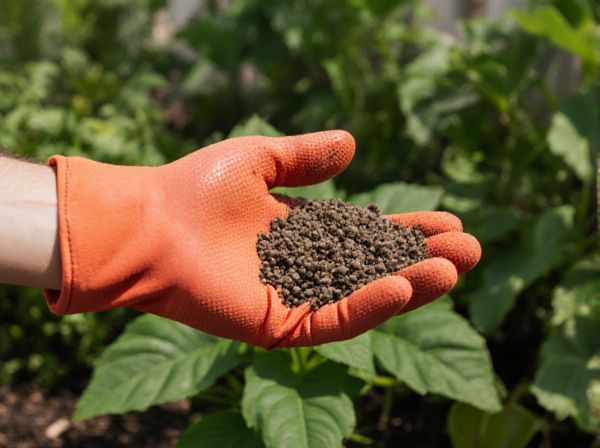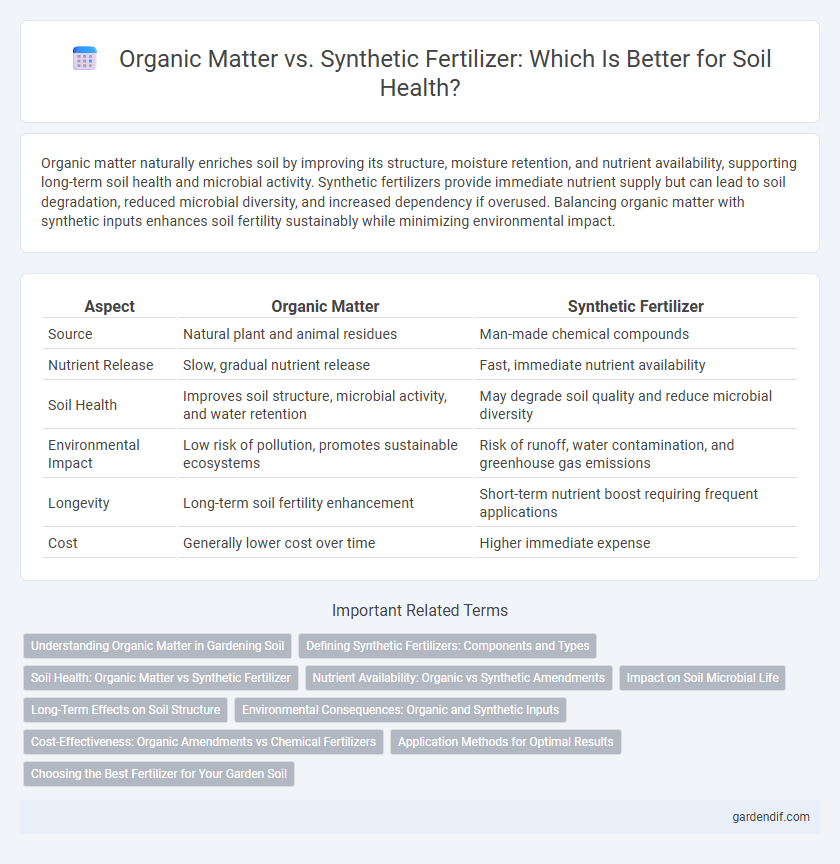
Organic Matter vs Synthetic Fertilizer Illustration
Organic matter naturally enriches soil by improving its structure, moisture retention, and nutrient availability, supporting long-term soil health and microbial activity. Synthetic fertilizers provide immediate nutrient supply but can lead to soil degradation, reduced microbial diversity, and increased dependency if overused. Balancing organic matter with synthetic inputs enhances soil fertility sustainably while minimizing environmental impact.
Table of Comparison
| Aspect | Organic Matter | Synthetic Fertilizer |
|---|---|---|
| Source | Natural plant and animal residues | Man-made chemical compounds |
| Nutrient Release | Slow, gradual nutrient release | Fast, immediate nutrient availability |
| Soil Health | Improves soil structure, microbial activity, and water retention | May degrade soil quality and reduce microbial diversity |
| Environmental Impact | Low risk of pollution, promotes sustainable ecosystems | Risk of runoff, water contamination, and greenhouse gas emissions |
| Longevity | Long-term soil fertility enhancement | Short-term nutrient boost requiring frequent applications |
| Cost | Generally lower cost over time | Higher immediate expense |
Understanding Organic Matter in Gardening Soil
Organic matter in gardening soil enriches nutrient availability, improves soil structure, and enhances water retention, promoting healthier plant growth compared to synthetic fertilizers. Unlike synthetic fertilizers that supply specific nutrients temporarily, organic matter supports long-term soil fertility by fostering beneficial microbial activity and nutrient cycling. Incorporating compost, manure, or plant residues increases organic matter content, leading to sustainable soil health and improved crop yields.
Defining Synthetic Fertilizers: Components and Types
Synthetic fertilizers consist primarily of chemically manufactured compounds designed to supply essential nutrients like nitrogen, phosphorus, and potassium directly to plants. Common types include ammonium nitrate, urea, superphosphate, and potassium chloride, each formulated to target specific nutrient deficiencies. These fertilizers often have a rapid nutrient release, contrasting with the slower mineralization process of organic matter in soil.
Soil Health: Organic Matter vs Synthetic Fertilizer
Organic matter enhances soil structure, promotes microbial diversity, and improves nutrient retention, leading to long-term soil health and fertility. Synthetic fertilizers provide immediate nutrient availability but can degrade soil organic content and disrupt microbial communities over time. Prioritizing organic matter supports sustainable soil ecosystems and resilience against erosion and nutrient depletion.
Nutrient Availability: Organic vs Synthetic Amendments
Organic matter enhances nutrient availability by improving soil structure, water retention, and microbial activity, which gradually releases nutrients in a form accessible to plants. Synthetic fertilizers provide immediate nutrient availability with precise nutrient ratios but lack the long-term benefits of soil health improvement. The slow-release nature of organic amendments promotes sustained nutrient supply and reduces nutrient leaching compared to synthetic fertilizers.
Impact on Soil Microbial Life
Organic matter enhances soil microbial diversity and activity by providing essential nutrients and habitat, promoting nutrient cycling and soil structure. Synthetic fertilizers often disrupt microbial communities by creating nutrient imbalances and reducing organic substrate availability, which can weaken soil health over time. Sustained use of organic inputs supports robust microbial populations critical for long-term soil fertility and ecosystem function.
Long-Term Effects on Soil Structure
Organic matter improves soil structure by enhancing aggregation, increasing porosity, and supporting beneficial microbial activity, which results in better water retention and aeration over time. Synthetic fertilizers often lack these benefits, potentially leading to soil compaction, reduced microbial diversity, and long-term degradation of soil health. Continuous application of synthetic fertilizers may diminish soil organic carbon levels, negatively impacting soil fertility and resilience.
Environmental Consequences: Organic and Synthetic Inputs
Organic matter enhances soil structure, increases water retention, and promotes beneficial microbial activity, leading to improved ecosystem health and reduced greenhouse gas emissions. Synthetic fertilizers can cause nutrient runoff, water pollution, and soil acidification, disrupting local biodiversity and contributing to climate change. Balancing organic inputs with responsible synthetic fertilizer use minimizes environmental damage and supports sustainable agricultural productivity.
Cost-Effectiveness: Organic Amendments vs Chemical Fertilizers
Organic amendments such as compost and manure improve soil structure and nutrient retention, offering long-term cost-effectiveness by reducing the need for frequent applications and minimizing environmental risks. Synthetic fertilizers provide immediate nutrient availability, but their recurring use often leads to higher cumulative costs due to soil degradation and increased dependence on chemical inputs. Balancing organic matter with synthetic fertilizer inputs enhances soil fertility sustainably while optimizing overall expenditure for crop production.
Application Methods for Optimal Results
Application methods for organic matter involve incorporating compost, manure, or cover crops directly into the soil to enhance microbial activity and nutrient retention. Synthetic fertilizers are typically applied through precise methods such as fertigation, foliar sprays, or side-dressing to ensure rapid nutrient availability and minimize leaching. Combining organic matter with targeted synthetic fertilizer applications promotes balanced nutrient cycling and sustainable soil fertility.
Choosing the Best Fertilizer for Your Garden Soil
Organic matter enhances garden soil by improving structure, moisture retention, and microbial activity, essential for long-term soil health and nutrient cycling. Synthetic fertilizers provide precise nutrient delivery, promoting rapid plant growth but risk causing nutrient imbalances and soil degradation over time. Selecting the best fertilizer depends on soil testing results, garden crop needs, and sustainability goals to optimize plant health and maintain soil fertility.
Organic Matter vs Synthetic Fertilizer Infographic

 gardendif.com
gardendif.com